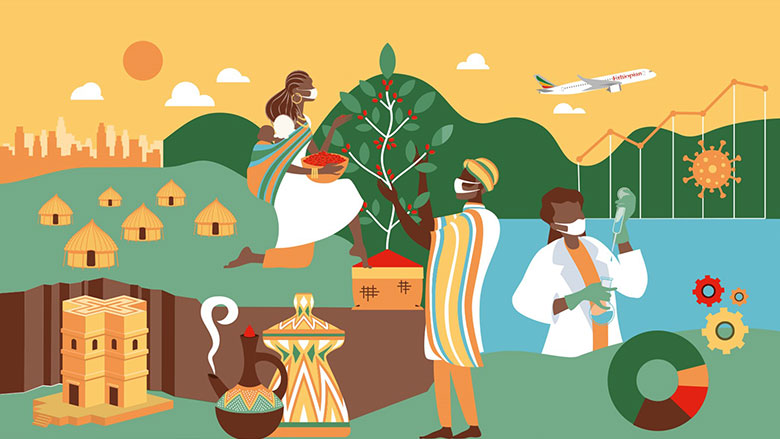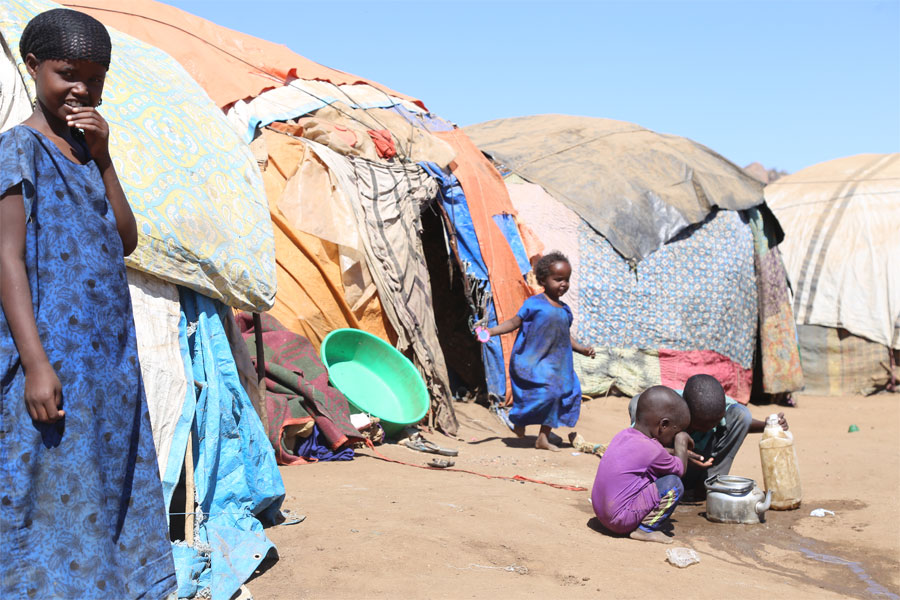
Viewpoints | Sep 04,2021
Sep 24 , 2022.
Look no further than the flower industry to appreciate the importance of the European market to underdeveloped economies such as Ethiopia. Within a decade and a half, the country has shot up the list of the largest flower exporters in the world to fifth place. Businesses that flooded the horticulture sector from Europe, especially the Netherlands, helped build the infrastructure and attracted massive investment. International financial institutions like the International Finance Corporation (IFC) have been handy in providing loans.
Export revenues have doubled to half a billion dollars. Last year, they increased by 16pc, and volume grew by 12pc to ??????, an impressive growth if it can be sustained. As is true for coffee, the European market has been the most significant contributor. The policymakers may want to replicate this success with fruits and vegetables, especially avocados.
Such growth and promise seem unlikely to continue in the long term. Even short-term prospects should be worrying. A global recession, at least in major regions, is sure to occur in the medium term as recovery from COVID-19 fizzles out in the face of geopolitical tensions and supply chain disruptions. No less impactful should be the consequence of Russia’s invasion of Ukraine.
Ethiopia appears to have highly self-absorbed and passive policymakers. By the time they begin to pay attention to these shifts in the global economic setting, the effects might have already hit the ground, if they have not already.
Both the International Monetary Fund (IMF) and the World Bank have slashed their projections for global growth owing to recurring crises. The United States, struggling with inflation for the first time in four decades, is trying to find its way out of the woods through a minor recession. China, the other pillar of global growth, has prospects of repeating its phenomenal development of the past three decades, dashed by its Zero-COVID policy and a ranging real estate crisis.
The most affected of the major markets could be Europe. Russia’s President Vladimir Putin’s decision to invade Ukraine impacts this region more than any other. War on the doorstep of one of the world's most stable and peaceful parts (since the 2000s) is not doing much for investors’ confidence. Dollar strength is leading to Euro and Pound sell-offs, and Right-wing populism, in Sweden recently and most likely in Italy later, is threatening EU’s unity.
Then there is energy insecurity. Even as benchmark crude oil prices have stabilised at around 100 dollars for months, that of natural gas is shooting off the charts. Highly dependent on Russia for cheap energy and powering the juggernaut economy of Germany, the costs of keeping factories running, houses warm and the lights on can be unsustainable. Even the nationalisation of power companies cannot calm the energy markets. A recession is likely for this region, impacting trade partners worldwide.
Undoubtedly, Ethiopia’s economy will be directly affected by the recession in Europe. It has trade surpluses with most European countries, an unusual phenomenon for the infamously feeble and uncompetitive economy. The biggest export destination this year was Switzerland, where all of the gold produced was sent and with which Ethiopia has over half a billion dollars in trade surplus. The Netherlands, the largest flower destination, has nearly a quarter of a billion dollars in trade surplus. Even Germany, one of the significant export powerhouses, runs a 97 million dollar trade deficit with Ethiopia.
Over a third of exports in goods make their way to the region, while not a single European country lists as a top 10 exporter to Ethiopia. It has been a highly worthwhile market for market actors here.
However advantageous, Europe is also a market under threat both in the short and long terms.
Consumers will likely cut back on spending in the short to medium term. This harms Ethiopian Airlines, which had just begun to recover, as travel expenses are apparent targets for households and businesses to cut back on to adjust to harsher economic circumstances. It is also detrimental to the coffee and flower industries, companies that thrive when times are good. Events thrive, and people go to restaurants and cafes during times of affluence.
Even if volumes may not go down, a falling value of the Euro will have exporters get less bang for the same amount. It has already hit parity with the dollar a few times and is currently at its lowest in two decades. In the official rate, year to date, the Birr has gained against the Euro. This should indicate something.
It is a trend that is likely to continue as long as the prospects of Europe’s economy remain uncertain and the US Treasury and central banks across developed economies hike interest rates.
Contracts, infrastructure and networks are too well locked in to re-orient in such a short period. But the short-term problems are symbolic of the long-term. With its ageing population and highly mature economy, Europe is projected to see slow growth and high inflation for the foreseeable future.
Nonetheless, Europe is not a market that could be avoided, mainly due to its geographic distance, which is far closer than the other major regions of North America and East Asia. Still, there is an acute need to diversify further.
The African continent is one of the most prominent places to do this. Compared to East African members, Ethiopia has far less trade with its near and distant neighbours. Exports to African countries are a mere 14.5pc of the total, with over half of this accounted for by Khat trade with Somalia. Kenya’s share of export with Sub-Saharan African countries, by comparison, is a third of the total.
This can be facilitated by fully embracing - beyond the traditional rhetoric - the African Continental Free Trade Area (AfCFTA) to engage more with nearer countries. Opening up the financial sector is a good start, where the players that engage will likely be regional financial institutions. Beyond this, though, Ethiopia’s policymakers on the economic front should move to make it possible to invest through capital liberalisation efforts, precisely a flexible exchange rate – a trade and investment barrier that makes engaging with Ethiopia’s market harder.
PUBLISHED ON
Sep 24,2022 [ VOL
23 , NO
1169]

Viewpoints | Sep 04,2021

Radar | Jul 13,2019

Fortune News | Oct 05,2025

Fortune News | Nov 21,2020

Covid-19 | May 01,2021

Sponsored Contents | Mar 03,2022

Fortune News | Mar 09,2019

Viewpoints | Dec 14,2024

My Opinion | Jan 01,2022

Editorial | Nov 30,2024

Photo Gallery | 177788 Views | May 06,2019

Photo Gallery | 168001 Views | Apr 26,2019

Photo Gallery | 158705 Views | Oct 06,2021

My Opinion | 137011 Views | Aug 14,2021

Dec 22 , 2024 . By TIZITA SHEWAFERAW
Charged with transforming colossal state-owned enterprises into modern and competitiv...

Aug 18 , 2024 . By AKSAH ITALO
Although predictable Yonas Zerihun's job in the ride-hailing service is not immune to...

Jul 28 , 2024 . By TIZITA SHEWAFERAW
Unhabitual, perhaps too many, Samuel Gebreyohannes, 38, used to occasionally enjoy a couple of beers at breakfast. However, he recently swit...

Jul 13 , 2024 . By AKSAH ITALO
Investors who rely on tractors, trucks, and field vehicles for commuting, transporting commodities, and f...

Oct 25 , 2025 . By YITBAREK GETACHEW
Officials of the Addis Abeba's Education Bureau have embarked on an ambitious experim...

Oct 26 , 2025 . By YITBAREK GETACHEW
The federal government is making a landmark shift in its investment incentive regime...

Oct 27 , 2025
The National Bank of Ethiopia (NBE) is preparing to issue a directive that will funda...

Oct 26 , 2025 . By SURAFEL MULUGETA
A community of booksellers shadowing the Ethiopian National Theatre has been jolted b...